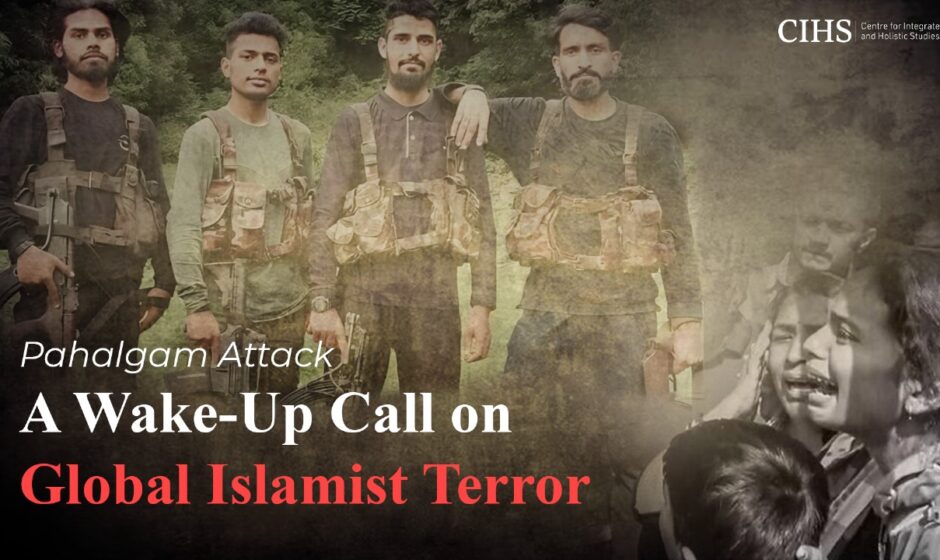Dr. Shailendra Kumar Pathak
On April 22, 2025, the tranquil hills of Baisaran near Pahalgam, Jammu and Kashmir, were torn apart by a chilling act of Islamist terrorism. In what stands as the deadliest civilian attack in the region in nearly two decades, four terrorists opened fire on a group of tourists, killing 26 people, including one Nepali citizen, and injuring over three dozen others. Eyewitnesses and digital evidence confirm this was no random shooting. Victims were asked to state their religion. Those unable to recite the Islamic Kalma were shot at close range.

Among the slain was a Hindu tourist from Jaipur, whose zipline camera intended to capture his joyful ride instead recorded his last moments, and something more damning: a zipline operator shouting “Allahu Akbar” during the attack. That operator, now under interrogation, has become a critical link in the case. In another video circulating widely, a ponywala is seen asking a tourist intrusive Islamic religious questions; his face has since been matched with a suspect sketch. Investigators have identified at least 15 locals suspected of assisting the terrorists—guides, ponywalas, and support staff, allegedly feeding information on tourist movements, faith identities, and schedules.
The terrorist outfit that claimed responsibility, The Resistance Front (TRF), is not an obscure entity. It is a front for Lashkar-e-Taiba (LeT), the same Pakistani group behind 2008 Mumbai attacks, 2006 train bombings, and 2001 Parliament assault. LeT is not just listed under the UN’s ISIL (Da’esh) & Al-Qaida Sanctions List as Entity QDe.118—its leader Hafiz Saeed is individually sanctioned (QDi.263) and subject to a global asset freeze and travel ban. Yet the UN Security Council’s April 25 statement on the Pahalgam attack offered nothing more than a sterilized platitude, condemning terrorism in vague terms while refusing to name the perpetrators. This is no clerical error; it is a calculated omission, an act of diplomatic cowardice.
The targeting of civilians based on identity is not new. 2008 Mumbai attacks saw Jewish hostages at the Chabad House tortured before being executed. In 2015, ISIS attackers at the Paris Bataclan theatre separated Muslims from non-Muslims before slaughtering the latter. In Sri Lanka (2019), ISIS-aligned suicide bombers killed over 250 Christians during Easter Sunday services. The Normandy church attack (2016) involved a priest being murdered at the altar by Islamic extremists. In Pakistan, churches, Ahmadiyya mosques, and Hindu temples have been bombed, often with tacit state approval or outright inaction.
October 7, 2023 massacre in Israel adds a stark, contemporary comparison. On that day, Hamas militants infiltrated Israeli border communities, murdering over 1,200 civilians, including women, children, and the elderly, in homes, at a music festival, and on the streets. Entire families were executed. Many victims were burned alive or taken hostage, including infants and Holocaust survivors. These attacks were not acts of war against military targets; they were ethnic-religious pogroms, carried out with ideological hatred against Jews. Multiple reports, including intercepted communications, revealed that fighters were explicitly told to “kill Jews,” not just Israelis. This ideology-driven massacre mirrors the Pahalgam killings in its intended religious cleansing, its brutality, and its celebration by supporters afterward.
Back in Pahalgam, grief has turned to fury. Families of victims, especially those who lost children and spouses, have spoken out about their sense of abandonment, not just by the security failure, but by the international community’s refusal to name the attackers. Their anger is amplified by reports of local betrayal. The suspicion that those who once served tea or led treks may have helped identify targets adds a deep psychological wound to an already devastating tragedy. Investigative agencies believe this network of collaborators may have fed attackers real-time location data, ensuring maximum carnage with minimal resistance.
The hypocrisy of Kashmir’s local response adds to the cynicism. While candlelight vigils were held to project an image of peace, journalists who arrived to report on the massacre were heckled, assaulted, and chased away. This duplicity, mourning in public, silencing in private—echoes the broader playbook used by Pakistan: deny, distract, deflect. For decades, Pakistan’s military intelligence (ISI) has funded, trained, and protected groups like LeT and Jaish-e-Mohammed. In case of Pahalgam, the role of Musa, a former Pakistani army commando, is of growing interest. Intelligence sources suggest Musa may have crossed over to direct operations or provide tactical training. Yet, his name is barely mentioned in international reports, a telling sign of selective attention.
The UN’s refusal to name TRF or Lashkar-e-Taiba, despite overwhelming evidence and the group’s own admission, underscores a deeper rot. If the world’s premier multilateral body cannot call out named terrorists already on their own sanctions list, it sends a message: Islamist terror enjoys immunity when it wears the right diplomatic camouflage. This soft-pedaling emboldens not only the perpetrators but their state sponsors. It reduces global counterterrorism to a performative charade.
And this is not an Indian problem alone. It is a global crisis. Boko Haram in Nigeria, Al-Shabaab in Kenya, ISIS in Iraq and Syria, Taliban in Afghanistan, and Pakistani-backed groups in South Asia have all deployed religious tests as tools of mass murder. Victims are asked to recite the Quran or Kalma. If they can’t, they are executed. From Christians in Sri Lanka to Yazidis in Sinjar, from Jews in Israel to Hindus in Bangladesh and Bharat, Islamist terror follows a consistent playbook: identify the non-believer, isolate them, and eliminate them.
The deeper tragedy is that much of the world still treats Islamist terror as a regional irritant rather than a global ideological threat. When white supremacists commit attacks, global condemnation is swift and names are named. When Islamist terrorists do the same, often with greater frequency and casualties, responses are diluted, obfuscated, or simply censored. The idea that naming the ideology behind terror would offend communities is both condescending and dangerous. It equates faith with fanaticism, and worse, it gives cover to ideological murderers.
We must confront a hard truth: the silence of global institutions, the equivocation of Western governments, and the duplicity of UN bodies like the Security Council have become enabling factors in this global war on pluralism. These institutions were built to uphold human rights and peace, but their unwillingness to confront Islamist terror in clear terms now makes them part of the problem. If a group like TRF, which openly claims attacks, has verifiable Pakistani links, and operates under a banned entity’s legacy, cannot even be named in a UN statement, then what value do international sanctions hold?
The Pahalgam massacre is not an isolated event. It is a node in a vast network of identity-driven Islamist terror attacks that stretch across continents and decades. Its ideological DNA matches that of Hamas, ISIS, LeT, Al-Shabaab, and dozens more. Its enablers, whether uniformed officers in Rawalpindi or masked men on mountain trails, function under a global web of protection: weak enforcement, ideological apologists, and selective outrage.
To respond adequately, the world must begin with clarity. That means naming the killers, exposing their backers, and treating Islamist terrorism as a transnational security threat. Countries must push for enforceable sanctions on Pakistan, not just as a harbour for terrorists but as a rogue state that uses jihadist groups as foreign policy instruments. Financial aid, military ties, and diplomatic cover must be conditional on verifiable dismantling of terror infrastructure.
This is not a war between religions. It is a war between pluralism and supremacism, between the right to live without fear and the desire to impose a singular ideology through violence. In such a battle, there is no room for neutrality. Silence is not diplomacy. It is surrender.
People who died in Pahalgam were not just victims of a terror attack; they were casualties in a global conflict which many still pretend doesn’t exist. World leaders’ refusal to acknowledge the pattern, ideology, and sponsors of such terror is not just cowardly, it is complicit.
Until the global community rises not only in grief but in naming and action, more blood will be shed. And the next attack, whether in a church, a synagogue, a temple, or a tourist camp, will again be “condemned in the strongest terms,” while the real perpetrators remain untouched.
This war is not against any one country but against diversity, against coexistence, against identity itself. And unless this war is met with clarity and resolve, it will be lost, not in one place, but everywhere.
(Author is a Delhi based researcher, Political Analyst & formerly an Assistant Professor of Political Science)



